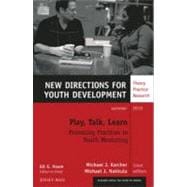
Note: Supplemental materials are not guaranteed with Rental or Used book purchases.
Purchase Benefits
What is included with this book?
| Issue Editors' Notes | |
| Executive Summary | |
| Youth mentoring with a balanced focus, shared purpose, and collaborative interactions | |
| This article presents the framework for understanding the nature of mentoring interactions that helps organize the other articles in this volume in terms of their analysis of interaction focus, purpose, and authorship | |
| Mutual but unequal: Mentoring as a hybrid of familiar relationship roles | |
| This article presents evidence favoring a hybrid model of relationships for successful school-based mentoring interactions | |
| "I dunno, what do you wanna do?": Testing a framework to guide mentor training and activity selection | |
| This article tests hypotheses regarding the distinction between relational and goal-directed interactions and the importance of collaborative activity negotiations between mentors and mentees | |
| Beyond the dichotomy of work and fun: Measuring the thorough interrelatedness of structure and quality in youth mentoring relationships | |
| This article presents and discusses associations between match structure (guiding purposes and activity focus) and ratings of mentoring relationship quality | |
| GirlPOWER! Strengthening mentoring relationships through a structured, gender-specific program | |
| This article describes a structured approach to supporting girls through the Big Brothers Big Sisters program that balances focus, purpose, and authorship | |
| Deconstructing serendipity: Focus, purpose, and authorship in lunch buddy mentoring | |
| This article describes the particulars of lunch buddy mentoring and the reasons that it might be an effective form of youth mentoring | |
| The structure of effective academic mentoring in late adolescence | |
| This article explores the structure of the academic mentoring relationship in late adolescence through analysis of its varied experiences and mentor behaviors | |
| Building mentoring relationships | |
| This first of three commentaries provides a historical perspective on the work presented in this volume | |
| Culture, context, and innovation: A Kiwi Canuck perspective | |
| Two leading practitioners discuss the benefits of the contributions in this volume for helping mentors working with youth in Canada, New Zealand, and other diverse contexts | |
| Structuring mentoring relationships for competence, character, and purpose | |
| This closing commentary addresses the importance of exploring different approaches to youth mentoring and the potential impact of such approaches on youth outcomes | |
| Index | |
| Table of Contents provided by Publisher. All Rights Reserved. |
The New copy of this book will include any supplemental materials advertised. Please check the title of the book to determine if it should include any access cards, study guides, lab manuals, CDs, etc.
The Used, Rental and eBook copies of this book are not guaranteed to include any supplemental materials. Typically, only the book itself is included. This is true even if the title states it includes any access cards, study guides, lab manuals, CDs, etc.